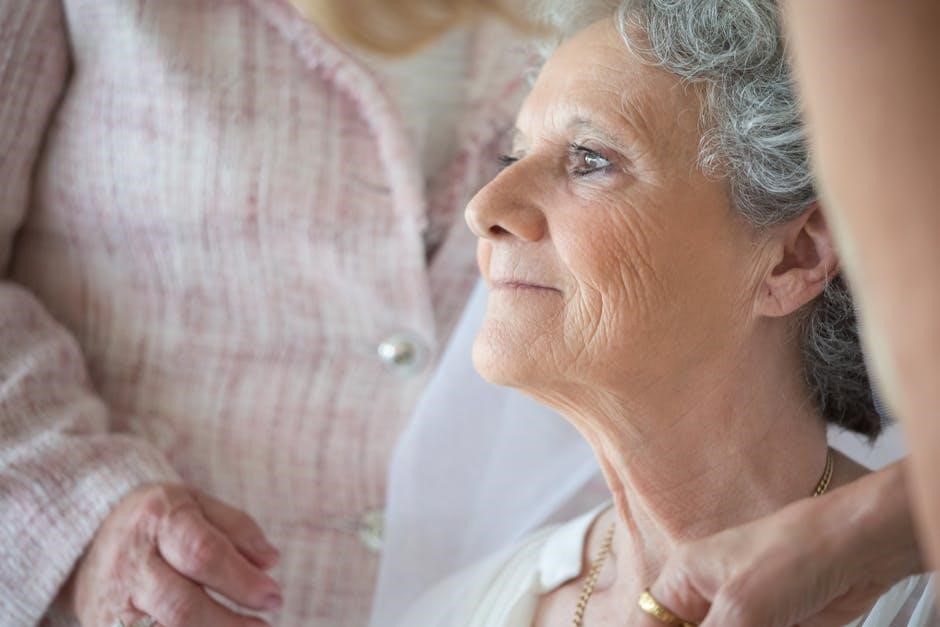
Adult development and aging explore the dynamic processes of growth, change, and adaptation across the lifespan, focusing on emotional, cognitive, and social transformations in adulthood.
1.1 Definition and Scope
Adult development and aging encompass the study of biological, psychological, and social changes across adulthood. This field examines growth, adaptation, and decline from early adulthood to old age, emphasizing lifespan perspectives. It integrates theories from psychology, sociology, and gerontology to understand the complexities of aging, addressing factors like health, cognition, and social roles. The scope extends to cultural and historical influences shaping adult life stages.
1.2 Importance of Studying Adult Development
Studying adult development is crucial for understanding lifelong growth, adaptation, and aging. It reveals how individuals navigate social, emotional, and cognitive changes, informing strategies to enhance well-being. Research in this area addresses health challenges, cognitive declines, and societal impacts, ultimately shaping policies and programs to support aging populations effectively across cultures and generations.
Theories of Adult Development
This section explores key theories explaining adult development, including Erikson’s psychosocial stages, cognitive development models, and socioemotional growth frameworks, shaping our understanding of aging processes.
2.1 Erikson’s Psychosocial Theory
Erikson’s psychosocial theory proposes eight stages of development, with adulthood marked by stages like “generativity vs. stagnation” and “integrity vs. despair.” These stages emphasize the importance of social and emotional growth, highlighting how adults find purpose and meaning. Erikson’s work builds on Freudian concepts but expands to include societal influences, offering a holistic view of adult development and aging processes.
2.2 Other Theoretical Models
Beyond Erikson, other theories explore adult development through diverse lenses. Cognitive theories, like Piaget’s, emphasize adult cognitive growth and adaptation. Socio-emotional models, such as those by Daniel Levinson, focus on life transitions and societal roles. The selective optimization with compensation (SOC) model by Baltes highlights strategies for aging well, while neurobiological perspectives examine brain changes. Each theory offers unique insights into adulthood’s complexities and aging processes.
Emotional Aspects of Aging
Aging influences emotional resilience, with many adults experiencing increased positivity and life satisfaction. Emotional regulation strategies often improve, fostering well-being despite life challenges and declining health.
3.1 The Positivity Effect
The positivity effect highlights older adults’ tendency to focus on positive emotions and experiences. As people age, they often prioritize emotional well-being, exhibiting increased life satisfaction and resilience. This shift enables them to navigate life challenges more effectively, fostering a sense of contentment and balance in later life. Such emotional adaptability plays a crucial role in successful aging.
3.2 Emotional Regulation and Well-being
Emotional regulation becomes more refined with age, as adults develop strategies to manage stress and maintain balance. Older adults often exhibit increased resilience, leveraging life experience to cope with challenges. This emotional adaptability enhances overall well-being, fostering a sense of stability and contentment despite aging-related changes. Effective regulation is a cornerstone of successful aging.
Cognitive Changes in Adulthood
Cognitive changes in adulthood include declines in memory and processing speed, yet many adults adapt through compensation strategies, maintaining functional abilities and overall cognitive health effectively.
4.1 Cognitive Declines
Cognitive declines in adulthood often include reduced memory capacity, slower processing speeds, and decreased executive function. These changes can affect problem-solving and decision-making abilities, impacting daily tasks. While some declines are inevitable, research suggests that lifestyle factors, such as mental engagement and physical activity, may mitigate their impact. Understanding these changes is crucial for developing strategies to support cognitive health in aging populations effectively.
4.2 Cognitive Compensation Strategies
Cognitive compensation strategies help older adults adapt to declines by leveraging remaining abilities; Mental practices, like puzzles or reading, enhance neuroplasticity. Lifestyle changes, such as exercise and social engagement, also support brain health. Additionally, external aids like memory journals or technology can assist. These strategies empower individuals to maintain independence and quality of life despite age-related cognitive changes, fostering resilience and adaptability in later years effectively.

Social Roles and Relationships
Adult development involves evolving social roles, such as transitioning from worker to retiree, and maintaining relationships that provide emotional support and contribute to overall well-being and life satisfaction.
5.1 Changing Social Roles
Adult development involves significant shifts in social roles, such as transitioning from worker to retiree or evolving family responsibilities. These changes often prompt identity reevaluation and adaptation to new societal expectations. Retirement, for instance, alters one’s sense of purpose and engagement, while aging may lead to taking on mentorship or caregiving roles. Such transitions can profoundly impact emotional well-being and life satisfaction.
5.2 Impact of Relationships
Relationships play a crucial role in shaping emotional and physical well-being across adulthood. Positive social connections enhance life satisfaction, while strained relationships may lead to stress or depression. Supportive relationships provide emotional stability, fostering resilience against age-related challenges. Strong social bonds are linked to better mental health and overall successful aging, making them essential for navigating life transitions effectively.

Health and Well-being
Health and well-being in adulthood involve managing chronic diseases, promoting physical activity, and maintaining mental health through balanced lifestyles, diet, and social support.
6.1 Chronic Diseases
Chronic diseases, such as diabetes, hypertension, and cardiovascular conditions, are prevalent in aging populations, significantly impacting quality of life. These conditions often arise from lifelong factors like diet, lifestyle, and genetics. Managing chronic diseases requires comprehensive healthcare strategies, including regular monitoring, medication adherence, and lifestyle modifications, to enhance well-being and reduce complications in older adults.
6.2 Health Promotion

Health promotion in aging focuses on enhancing well-being through lifestyle modifications, preventive care, and community engagement. Strategies include physical activity, balanced nutrition, and stress management, which contribute to maintaining functional independence. Early interventions and education on aging-related health issues are crucial for fostering resilience and improving quality of life among older adults, reducing the risk of chronic diseases and promoting successful aging.

Successful Aging
Successful aging involves adapting to life changes, maintaining physical and mental well-being, and engaging in meaningful activities. It emphasizes resilience, positive lifestyle choices, and social connections, fostering a fulfilling life across adulthood.
7.1 Definitions and Models
Successful aging is defined by adaptability, resilience, and positive lifestyle choices, emphasizing physical, mental, and social well-being. Models like Rowe and Kahn’s framework highlight functional capacity, engagement, and absence of disease. The Selection, Optimization, Compensation model by Baltes and Baltes underscores adaptive strategies to maintain functioning despite age-related declines, promoting a dynamic view of aging as an active, multifaceted process.
7.2 Strategies for Successful Aging
Strategies for successful aging include adopting healthy lifestyles, maintaining cognitive engagement, and fostering strong social connections. Emotional resilience, lifelong learning, and physical activity promote well-being. Health promotion through preventive care and stress management is crucial. Leveraging cultural and community support enhances adaptability, enabling individuals to thrive despite age-related challenges, ensuring a fulfilling and purposeful later life.
Cultural Influences
Cultural values shape perceptions of aging, influencing adult development through societal norms, family roles, and community expectations, impacting emotional and social well-being across the lifespan.
8.1 Cultural Perspectives
Cultural perspectives significantly influence adult development and aging, shaping societal attitudes toward older adults. In some cultures, aging is revered, with elders holding esteemed roles, while others prioritize youth. These perspectives affect emotional well-being, social engagement, and cognitive development. Understanding cultural differences is crucial for fostering inclusive support systems that honor diverse values and promote successful aging across global communities.
8.2 Cross-Cultural Differences
Cross-cultural differences significantly shape the experiences of adult development and aging. Societal attitudes, values, and norms influence how aging is perceived and addressed. For instance, collectivist cultures often prioritize family and intergenerational support, while individualist cultures emphasize personal independence. These differences impact emotional well-being, social engagement, and access to resources, highlighting the need for culturally sensitive approaches to support aging populations effectively.

Policy and Programs
Policy and programs play a crucial role in addressing aging challenges, promoting well-being, and ensuring supportive frameworks for adult development. Initiatives like the White House Conference on Aging (1971) have historically driven research, teaching, and service development in this field, shaping effective strategies for older adults.
9.1 Policy Implications
Policy implications for adult development and aging emphasize the need for comprehensive frameworks to address chronic diseases, cognitive changes, and social role shifts. Gerontological research highlights the importance of integrating healthcare, education, and social support systems to promote successful aging. Initiatives like AgeTech innovations and community engagement programs are critical in fostering well-being for older adults. These policies must adapt to demographic shifts and emerging trends to ensure inclusivity and effectiveness.
9.2 Support Programs
Support programs for adult development and aging focus on enhancing well-being through community engagement, mental health services, and skill-building initiatives. These programs often include health promotion activities, educational workshops, and AgeTech innovations to address cognitive and physical changes. By fostering social connections and providing accessible resources, such programs empower older adults to maintain independence and thrive in their communities, aligning with broader societal goals of promoting successful aging. These efforts are vital for addressing the diverse needs of an aging population.

Future Research Directions
Future research should focus on understanding biological mechanisms of aging, promoting healthy aging, and developing interventions to enhance well-being across the lifespan.
10.1 Emerging Trends
Emerging trends in adult development and aging research include advancements in technology, such as wearable devices and AI, to monitor and enhance health. Personalized medicine and genetic studies are gaining traction, offering tailored interventions for age-related diseases. Additionally, there is a growing emphasis on cultural and societal shifts, such as increased focus on mental health and community engagement in older adults.
These trends highlight the importance of interdisciplinary approaches to address the complex needs of aging populations. Innovations in policy and healthcare systems are also critical to support the well-being of older adults in a rapidly changing world.
10.2 Research Gaps
Despite advancements, research gaps remain in understanding adult development and aging, particularly in longitudinal studies across diverse populations. There is limited exploration of cultural influences on aging processes and the impact of historical events on developmental trajectories. Additionally, the biological mechanisms of aging and their psychological implications are not fully understood, hindering the development of targeted interventions.
Further research is needed to address these gaps and improve outcomes for aging populations worldwide.